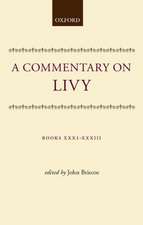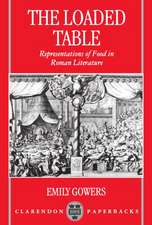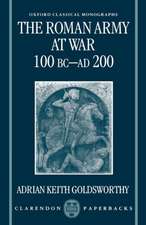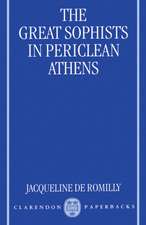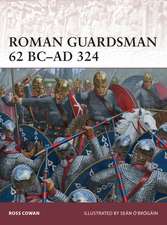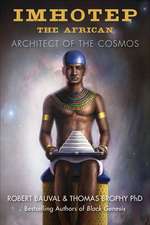Roman Imperial Themes
Autor P. A. Brunten Limba Engleză Hardback – 10 mai 1990
Preț: 1132.27 lei
Preț vechi: 1715.64 lei
-34% Nou
Puncte Express: 1698
Preț estimativ în valută:
216.65€ • 226.82$ • 179.27£
216.65€ • 226.82$ • 179.27£
Carte tipărită la comandă
Livrare economică 25-31 martie
Preluare comenzi: 021 569.72.76
Specificații
ISBN-13: 9780198144762
ISBN-10: 0198144768
Pagini: 558
Dimensiuni: 160 x 242 x 38 mm
Greutate: 0.95 kg
Editura: OUP OXFORD
Colecția OUP Oxford
Locul publicării:Oxford, United Kingdom
ISBN-10: 0198144768
Pagini: 558
Dimensiuni: 160 x 242 x 38 mm
Greutate: 0.95 kg
Editura: OUP OXFORD
Colecția OUP Oxford
Locul publicării:Oxford, United Kingdom
Cuprins
Sulla and Asian publicans; The revolt of Vindex and the fall of Nero; Tacitus on the Baravian revolt; Charge of provincial maladministration under the early principate; Augustan imperialism; Reflections on British and Roman imperialism; The 'fiscus' and its development; Procural jurisdiction; Conscription and volunteering in the Roman Imperial Army; The administrators of Roman Egypt; Did imperial Rome disarm her subject?; The Romanization of the local ruling classes in the Roman Empire; Josephus on social conflicts in Roman Judaea; Laus Imperii; The revenues of Rome; Roman imperial illusions; Addenda to chapters 1, 2, 3, 4, 6, 9, 10, 12, 13, 14, and 15; Indexes
Recenzii
'a humane and judicious historian who is as diligent in the pursuit of truth as he is untrammelled by dogma of any kind'Times Higher Education Supplement
'f one wished to compare B.'s contribution to imperial history, as expresed in this volume, to that of any other recent British scholar, it would be to A.H.M. Jones. The mastery of the ancient evidence, the interest in institutions and their workings, the concentration on serious historical questions, all evoke comparison with Jones' many contributions to Roman imperial history. I trust I can pay the author and this volume no greater compliment than to make such a comparison'.G.P. Burton, Department of History, University of Manchester.
`Welcome collection... This austerely distinguished collection is a model of method throughout, above all in its scrupulous refusal to go beyond the evidence and its unbending insistence that painfully often we do not, perhaps cannot know the answers to our questions'.Robin Seager, The Classical Review, vol XLI, no 2, 1991.
'This updating makes the book indispensable ... No scholar still active in the field of Roman history has done more than Brunt to refute error, to establish truth, and to see how the Roman Empire actually worked. For some forty years he has stuck to his last, supremely professional, letting the lucida tela diei ^iinto some of the dark places of imperial history. Three generations of scholars are already in his debt, as their successors will also be.'Colin Wells, Trinity University, Texas, EHR Jan. 92
'f one wished to compare B.'s contribution to imperial history, as expresed in this volume, to that of any other recent British scholar, it would be to A.H.M. Jones. The mastery of the ancient evidence, the interest in institutions and their workings, the concentration on serious historical questions, all evoke comparison with Jones' many contributions to Roman imperial history. I trust I can pay the author and this volume no greater compliment than to make such a comparison'.G.P. Burton, Department of History, University of Manchester.
`Welcome collection... This austerely distinguished collection is a model of method throughout, above all in its scrupulous refusal to go beyond the evidence and its unbending insistence that painfully often we do not, perhaps cannot know the answers to our questions'.Robin Seager, The Classical Review, vol XLI, no 2, 1991.
'This updating makes the book indispensable ... No scholar still active in the field of Roman history has done more than Brunt to refute error, to establish truth, and to see how the Roman Empire actually worked. For some forty years he has stuck to his last, supremely professional, letting the lucida tela diei ^iinto some of the dark places of imperial history. Three generations of scholars are already in his debt, as their successors will also be.'Colin Wells, Trinity University, Texas, EHR Jan. 92

